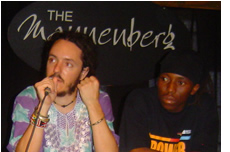There is palpable excitement in the streets of Bulawayo after Simba Makoni held his first rally here on March 1. When the former finance minister first announced he was throwing his hat in the political ring, public sentiment was that this man was a Zanu PF plant, a creation of the feared Central Intelligence Organisation (CIO). But when the Zanu PF hate-speech machinery went into overdrive, public sentiment appeared to shift with doubting Toms revising their previous positions and opinions about the man who looks set to change Zimbabwe’s post-independence political history.
He has undoubtedly become Mugabe’s closest challenger, and that he has failed to impress Tsvangirai who has also verbally assaulted him with all sorts of epithets after Mugabe said very unflattering things about the man he previously entrusted with the keys to the famous briefcase carried to parliament by ministers of finance to present the national budget.
Bulawayo has traditionally voted MDC since 2000, but ever since the 2005 split, the once powerful political opposition has paled in popularity with disgruntled former supporters feeling the struggle for a better Zimbabwe has been sacrificed at the altar of self-aggrandisement. It is with great interest then to attempt to look through the crystal ball and indulge in some clairvoyance and interrogate and dissect how the voting patterns will be influenced by the coming of Makoni into the presidential race.
Voters here have been apathetic since the drubbing of the MDC in 2000 and 2002, but it is increasingly appearing this is about to change just a few days before the poll. But one also meets lay analysts in the “invisible press” where the public sphere has become a platform where all sorts of theories and philosophies fly fast and furious. I eavesdropped the other day on some chaps at a funeral wake exchanging their insights about the entrance of Makoni into the presidential race and the Bulawayo rally.
The sentiment was this chap is a creation of the aged and senile Robert Mugabe who wants to split the vote by stealing the ballot from Tsvangirai. It is interesting each time the battle for State House is discussed Mutambara is never mentioned, not because he withdrew from the race to make way for Makoni as he claims, but because he has never been recognised as kosher challenger to the presidency by many here. The guys at the wake were convinced Makoni was a CIO plot/creation and for them Tsvangirai remained the only credible challenger to Mugabe.
They said Makoni was a greenhorn in the lonely and mean streets of the old dirty game and was not about to be taken seriously. They questioned why Dumiso Dabengwa who they accept as a “home boy” was with Mugabe a few days before his grand appearance to present Makoni to the people at the March 1 rally. Because these analysts are potential voters for whom like everybody else information is indeed power for them to decide who to vote for, it raises the issue of claims of vote rigging from the opposition, i.e., Makoni, Tsvangirai and the other fellow who everyone seems to be ignoring in the March 2008 discourse. This is because while public sentiment appears to be the mass unpopularity of Mugabe, his claim that he won the crucial poll when everything else points to his first ever electoral humiliation will only be met with curious if not violent reactions.
This therefore begs the issue of not only vote rigging, but importantly votes being split after the so-called democratic forces refused to approach the polls from a united front. But the fact that Makoni has already said he is not aligned to anyone, and Dabengwa having said they are not seeking regime change but leadership change, it means there never was going to be any united challenge to Mugabe as these men have said they are Zanu PF. It would apparently point to the age old frustration among many voters and analysts alike that the opposition will never win the presidency, and if Makoni wins, this will certainly confirm that! After all, they have already said they have not formed a break away party, but rather seek to reform the party after the old guard dug in their heels about making way for fresh blood and therefore steering the country to its former glory as Southern Africa’s second largest economy.
This would then put a man like Tsvangirai in a fix if the reception Makoni has received so far countrywide is anything to go by. Whether Mutambara is a shrewd politician by his many switches and paving the way for Makoni is for history to judge, but then the question among the people has been why he would give way to an avowed Zanu PF “cadre” and take every opportunity to cast one would be a genuine partner in the struggle for Zimbabwe in very bad light?
Therein lies in the confusion that has plagued voters a few weeks before the poll where loyalties have not been decided thus likely to give the ballot to anyone other than Tsvangirai. If men sitting around a fire at a funeral wake can discuss critical issues and cloud them with conspiracies, it would point to opposition politicians having only themselves to blame when the country is further plunged into a voracious vortex once Mugabe wins the ballot by hook or by crook.










